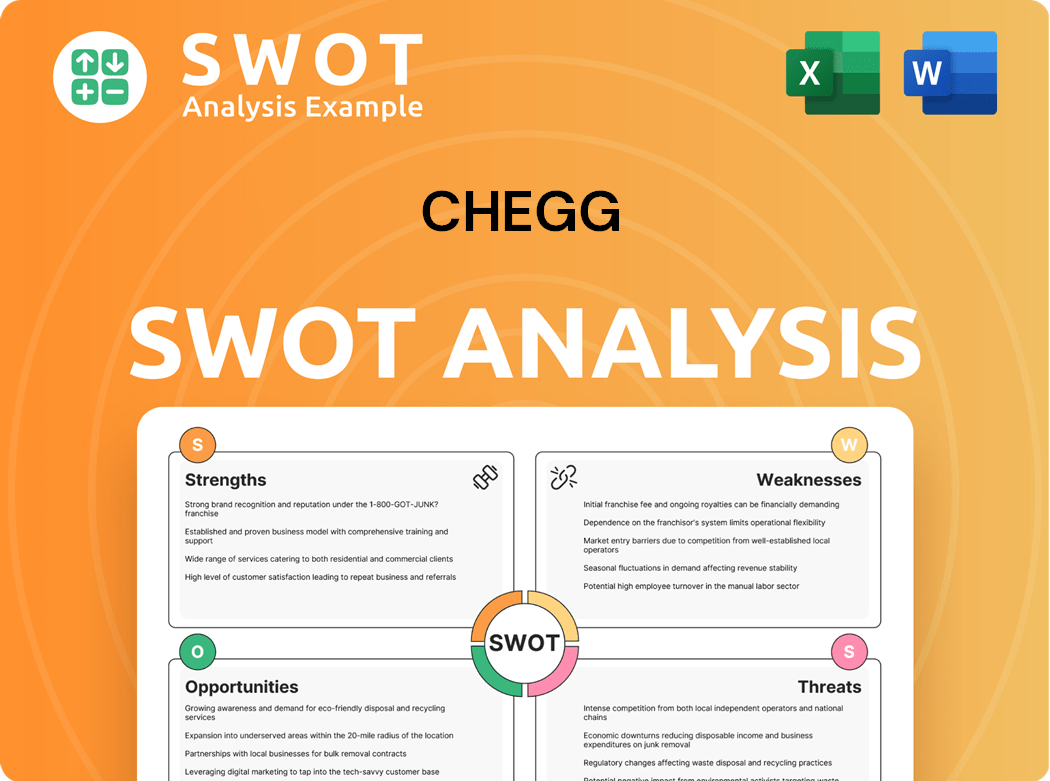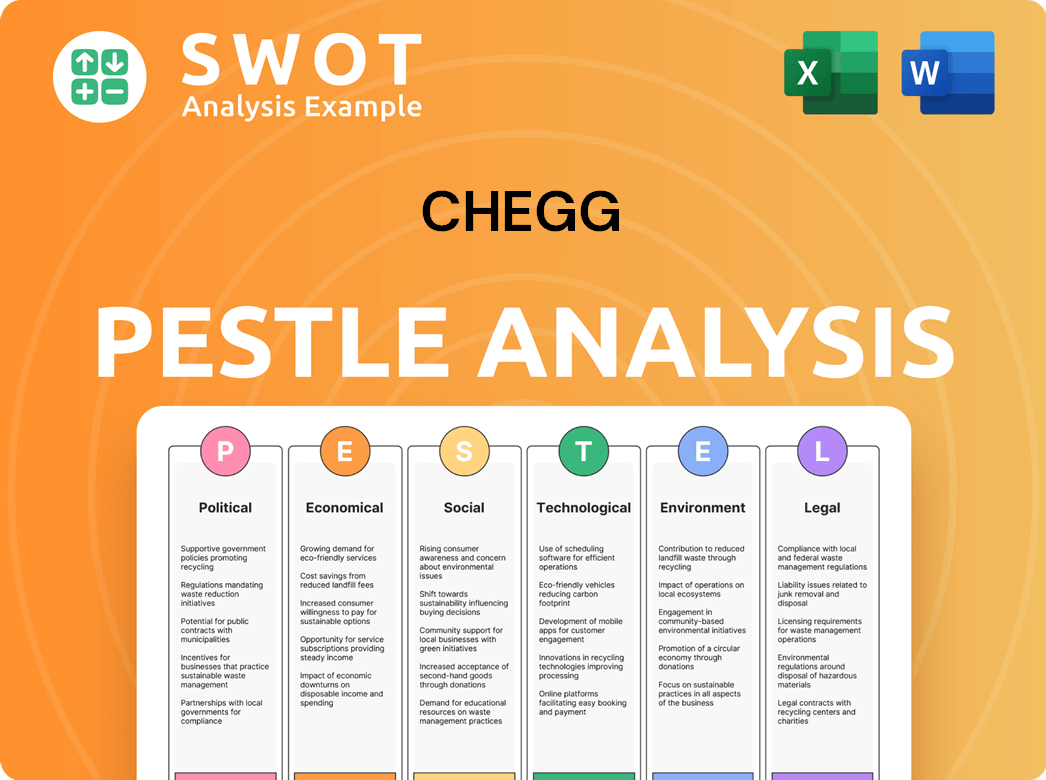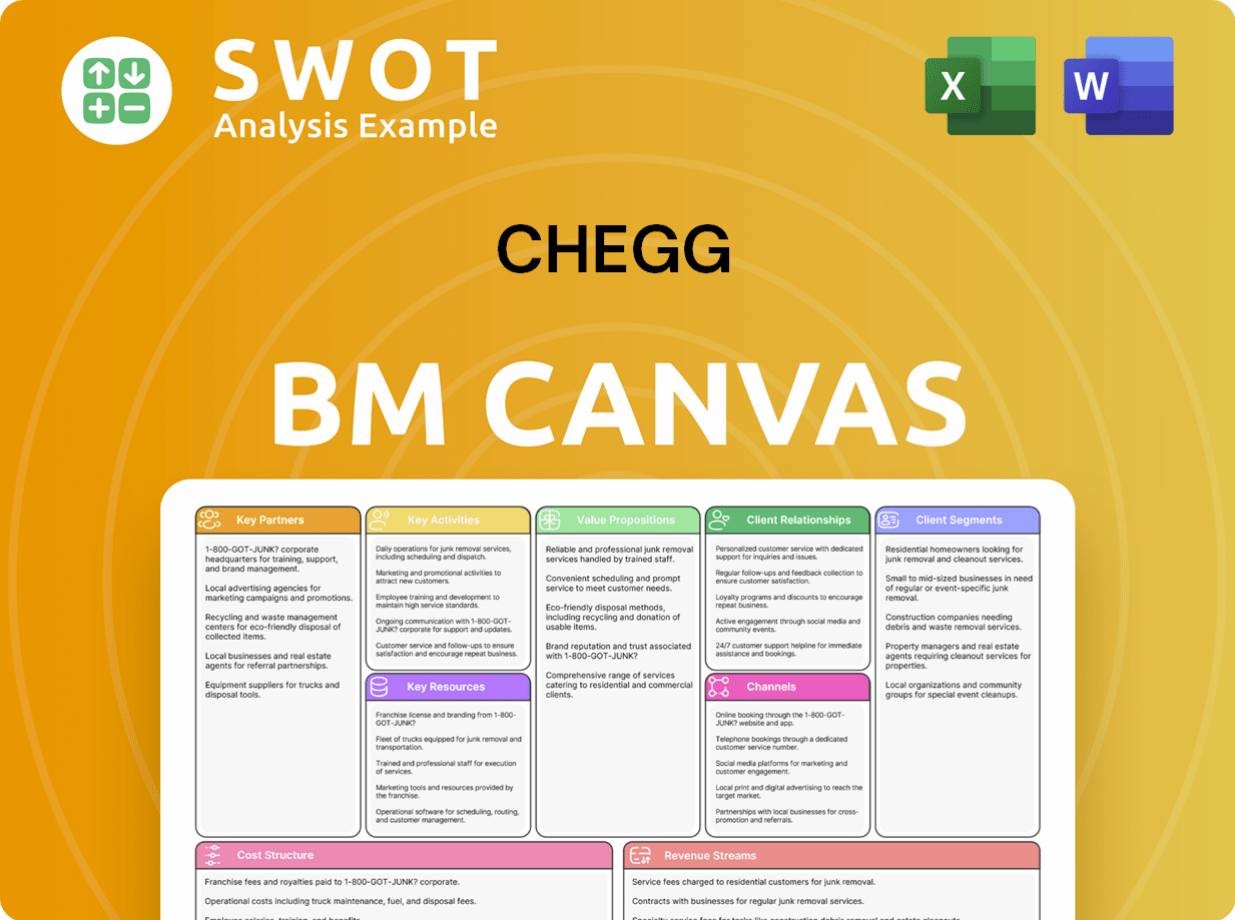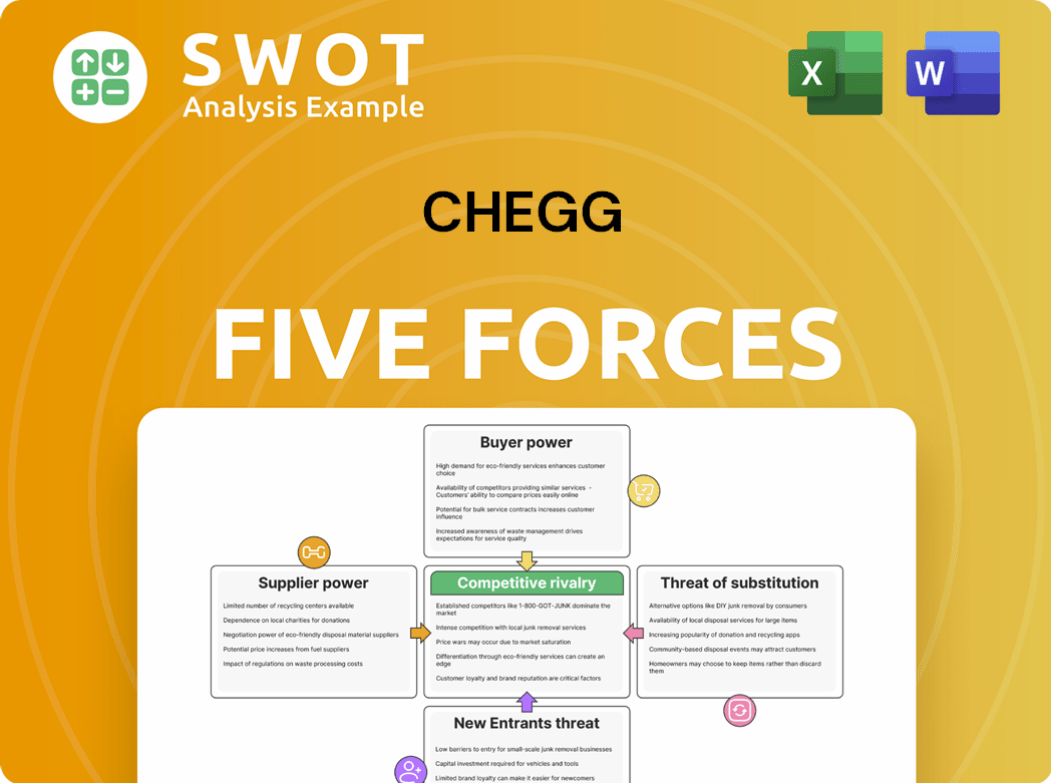Chegg Bundle
Can Chegg Conquer the Future of Education?
Chegg, a pioneer in the EdTech industry, has dramatically reshaped the academic landscape since its 2005 launch. From its roots in textbook rentals, the Chegg SWOT Analysis showcases the company's evolution into a comprehensive online education platform, offering a suite of digital learning tools. This transformation highlights Chegg's commitment to adapting and thriving in the dynamic world of online education.

This exploration delves into Chegg's growth strategy, examining its expansion plans and how it aims to maintain its competitive edge. Understanding Chegg's future prospects requires a close look at its business model analysis, revenue streams, and the challenges and opportunities it faces within the EdTech industry. We'll also investigate Chegg's financial performance, user base growth, and its impact on education, providing insights for investors and stakeholders alike.
How Is Chegg Expanding Its Reach?
The expansion initiatives of the company are primarily focused on diversifying its service offerings and exploring new market opportunities. This strategy aims to enhance its existing services and introduce new features to maintain a competitive edge in the dynamic digital learning landscape. The company's approach is to leverage technological advancements, particularly in AI, to provide more personalized and effective learning experiences.
A key component of this expansion involves the enhancement of the Chegg Study Pack, which includes services like Chegg Study, Writing, Math, and Career. The integration of AI-powered features, such as the planned launch of CheggMate in partnership with OpenAI, is a significant step. This initiative is designed to address the evolving needs of students and improve user engagement and retention through a more comprehensive and technologically advanced platform.
Product expansion also plays a crucial role, with a focus on improving core services such as Chegg Study and Chegg Writing. Furthermore, the company is exploring opportunities to expand its skills-based learning offerings, recognizing the growing demand for practical skills in the job market. The company's strategic rationale is to attract new customers while also increasing engagement and retention among existing users.
The collaboration with OpenAI to launch CheggMate is a major initiative. This AI-enhanced learning assistant aims to provide a more personalized and effective learning experience. This integration is designed to keep the company competitive in the digital learning space.
The company is exploring opportunities to expand its skills-based learning offerings. This expansion recognizes the growing demand for practical skills in the job market. This move aims to attract new customers and increase user engagement.
The company is focused on improving its core services, including Chegg Study and Chegg Writing. These enhancements are aimed at increasing user satisfaction and providing a more comprehensive learning experience. Continuous improvement of existing services is a key strategy.
The emphasis on digital services allows for broader geographical reach without significant physical infrastructure. This inherent advantage supports the company's expansion plans. The digital nature of its offerings facilitates scalability.
The strategic rationale behind these initiatives is to attract new customers and increase engagement and retention among existing users. The company aims to offer a more comprehensive and technologically advanced learning platform. These efforts are designed to drive sustainable growth and maintain market leadership in the EdTech industry.
- Chegg growth strategy focuses on diversifying services and integrating AI.
- The company is enhancing its core offerings and exploring skills-based learning.
- Digital services allow for broader geographical reach and scalability.
- The goal is to improve user experience and drive sustainable growth.
Chegg SWOT Analysis
- Complete SWOT Breakdown
- Fully Customizable
- Editable in Excel & Word
- Professional Formatting
- Investor-Ready Format

How Does Chegg Invest in Innovation?
The company's innovation and technology strategy centers on using artificial intelligence (AI) and machine learning to enhance its educational offerings. This approach is a key part of the overall Chegg growth strategy, aiming to provide students with more personalized and effective learning tools. The company's focus on technology is also a strategic move to stay ahead in the EdTech industry.
A major element of this strategy is the development and integration of AI-powered tools, such as CheggMate. This AI learning assistant, built on OpenAI's GPT-4, is designed to offer students personalized support. This includes providing step-by-step solutions, detailed explanations, and practice problems. The company's investment in AI reflects the increasing importance of AI in education.
Beyond CheggMate, the company continuously refines its existing platforms, including Chegg Study and Chegg Writing, by incorporating AI. This is done to improve content delivery, plagiarism detection, and writing assistance. The company's move from physical textbook rentals to a digital subscription model showcases its commitment to digital transformation. This shift is supported by cloud-based infrastructure and data analytics, allowing for personalized learning experiences. This focus is crucial for the company to maintain its leadership in the EdTech sector.
The company is heavily investing in AI to improve its services. CheggMate, an AI learning assistant, is a prime example of this. This tool offers personalized support, step-by-step solutions, and practice problems.
The company continuously refines its platforms like Chegg Study and Chegg Writing. AI is integrated to improve content delivery, plagiarism detection, and writing assistance. This ensures that the services remain relevant and effective for students.
The company has shifted from physical textbook rentals to a digital subscription model. This shift is driven by cloud-based infrastructure and data analytics. This allows for personalized learning experiences.
While specific R&D investment figures are not always detailed, the company's product updates and partnerships with leading AI firms indicate a strong commitment to technological advancement. This ongoing investment is crucial for staying competitive.
Data analytics plays a key role in personalizing learning experiences. By analyzing user data, the platform can tailor content and support to individual student needs. This enhances the effectiveness of the learning process.
The company's use of cloud-based infrastructure supports its digital subscription model. This infrastructure provides the scalability and flexibility needed to handle a large user base and deliver services efficiently. This is a key element of the Chegg company's tech strategy.
The company's technology strategy is focused on AI integration, platform enhancements, and digital transformation. These efforts aim to improve the user experience and maintain a competitive edge in the EdTech industry.
- AI Integration: Development of AI-powered tools like CheggMate for personalized learning.
- Platform Enhancements: Continuous updates to Chegg Study and Chegg Writing with AI features.
- Digital Transformation: Transition to a digital subscription model supported by cloud infrastructure.
- Data Analytics: Utilizing data to personalize learning experiences and improve content delivery.
- R&D Investments: Ongoing investment in research and development to advance technological capabilities.
Chegg PESTLE Analysis
- Covers All 6 PESTLE Categories
- No Research Needed – Save Hours of Work
- Built by Experts, Trusted by Consultants
- Instant Download, Ready to Use
- 100% Editable, Fully Customizable

What Is Chegg’s Growth Forecast?
The financial outlook for the company reflects a period of strategic adaptation within the dynamic EdTech industry. The company's approach is centered around maintaining financial health and investing in growth initiatives, particularly in response to shifts in the educational landscape. This strategy is crucial for navigating the competitive environment and ensuring long-term sustainability.
For the first quarter of 2024, the company reported total revenues of $174.3 million, with Chegg Services revenues at $155.6 million. The net income for Q1 2024 was $12.4 million, or $0.11 per share. These figures highlight the company's current financial standing and its ability to generate revenue in the online education platform market.
Looking ahead, the company anticipates total revenues for the second quarter of 2024 to be between $157 million and $159 million, with Chegg Services revenues projected between $139 million and $141 million. For the full year 2024, the company expects total revenues to be between $600 million and $605 million, and Chegg Services revenues between $535 million and $540 million. These projections indicate a cautious but stable financial trajectory, reflecting the company's efforts to adapt its business model.
In Q1 2024, the company's total revenues were $174.3 million, with Chegg Services contributing $155.6 million. Net income for the same period was $12.4 million, or $0.11 per share. These figures are vital for understanding the company's financial performance and its ability to generate profit.
For Q2 2024, the company projects total revenues between $157 million and $159 million. Chegg Services revenue is expected to be between $139 million and $141 million. These forecasts provide insight into the anticipated short-term financial performance of the company.
The company anticipates total revenues for the full year 2024 to be between $600 million and $605 million. Chegg Services revenue is projected between $535 million and $540 million. These full-year expectations are crucial for assessing the company's long-term financial health.
The company's emphasis on free cash flow generation, which was $33.4 million in Q1 2024, underscores its commitment to financial health. This focus allows for reinvestment in growth initiatives and supports the company's strategic goals. The company's financial health is also discussed in detail in the article about Owners & Shareholders of Chegg.
The company's financial ambitions are underpinned by its strategy to enhance its core services and integrate AI-powered tools. The company is also exploring new revenue streams to support sustained growth in the competitive EdTech market. These initiatives are key to the company's Chegg growth strategy.
The company's financial performance is influenced by the rise of generative AI and other factors in the EdTech industry. Adapting to these changes is critical for maintaining a competitive edge and ensuring future prospects. Understanding these market dynamics is crucial for evaluating the Chegg future prospects.
Chegg Business Model Canvas
- Complete 9-Block Business Model Canvas
- Effortlessly Communicate Your Business Strategy
- Investor-Ready BMC Format
- 100% Editable and Customizable
- Clear and Structured Layout

What Risks Could Slow Chegg’s Growth?
The Chegg company faces several risks that could affect its Chegg growth strategy and future. The rapid evolution of the EdTech industry and intense competition are key challenges. The emergence of generative AI tools poses a significant threat to its homework help services, requiring continuous adaptation.
Market competition from established and emerging players in the online education platform space is another major risk. Regulatory changes related to data privacy and online education could also create obstacles. Internal resource constraints, particularly in attracting and retaining top talent, could hinder innovation and product development.
Chegg's management actively assesses these risks through market analysis and strategic planning. They focus on service diversification and innovation to maintain their competitive position. The company is also working on integrating AI into its solutions, such as with CheggMate, to adapt to technological changes.
The rise of AI tools that provide instant answers to academic questions directly challenges Chegg's core homework help services. This could reduce the demand for Chegg's traditional offerings. The company needs to innovate quickly to stay relevant in this evolving landscape.
Competition comes from both established EdTech companies and new startups. These competitors offer similar or alternative learning solutions. Chegg must differentiate itself to maintain its market share and attract users.
Changes in data privacy regulations and online education policies can create operational challenges. Chegg needs to adapt its operational frameworks. Compliance with these regulations is essential for its continued operation.
Attracting and retaining top talent, especially in AI and content development, can be difficult. Limited resources can hinder innovation and product development. This can impact Chegg’s ability to compete effectively.
Economic downturns or shifts in student spending habits can affect demand for Chegg's services. Changes in the higher education market can also impact the company. Chegg must be prepared for economic fluctuations.
Cybersecurity threats and system failures can disrupt services and damage Chegg's reputation. The company needs to invest in robust security measures. Technological advancements could also render existing services obsolete.
Chegg's challenges include adapting to AI and competition. The company’s opportunities include expanding its services and global reach. Chegg aims to leverage AI to enhance its offerings and maintain its market position. To understand more about Chegg's target audience, you can read Target Market of Chegg.
Financial performance is subject to fluctuations in subscription rates and user growth. Economic downturns can reduce student spending. The company faces risks related to revenue recognition and cost management. Chegg’s ability to maintain profitability is a key concern.
Chegg Porter's Five Forces Analysis
- Covers All 5 Competitive Forces in Detail
- Structured for Consultants, Students, and Founders
- 100% Editable in Microsoft Word & Excel
- Instant Digital Download – Use Immediately
- Compatible with Mac & PC – Fully Unlocked

Related Blogs
- What are Mission Vision & Core Values of Chegg Company?
- What is Competitive Landscape of Chegg Company?
- How Does Chegg Company Work?
- What is Sales and Marketing Strategy of Chegg Company?
- What is Brief History of Chegg Company?
- Who Owns Chegg Company?
- What is Customer Demographics and Target Market of Chegg Company?
Disclaimer
All information, articles, and product details provided on this website are for general informational and educational purposes only. We do not claim any ownership over, nor do we intend to infringe upon, any trademarks, copyrights, logos, brand names, or other intellectual property mentioned or depicted on this site. Such intellectual property remains the property of its respective owners, and any references here are made solely for identification or informational purposes, without implying any affiliation, endorsement, or partnership.
We make no representations or warranties, express or implied, regarding the accuracy, completeness, or suitability of any content or products presented. Nothing on this website should be construed as legal, tax, investment, financial, medical, or other professional advice. In addition, no part of this site—including articles or product references—constitutes a solicitation, recommendation, endorsement, advertisement, or offer to buy or sell any securities, franchises, or other financial instruments, particularly in jurisdictions where such activity would be unlawful.
All content is of a general nature and may not address the specific circumstances of any individual or entity. It is not a substitute for professional advice or services. Any actions you take based on the information provided here are strictly at your own risk. You accept full responsibility for any decisions or outcomes arising from your use of this website and agree to release us from any liability in connection with your use of, or reliance upon, the content or products found herein.